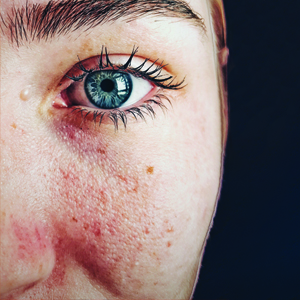Eczema is a frustrating skin condition that causes redness, itching, and inflammation. But did you know that hormones and eczema are closely linked—especially for women? Fluctuations in estrogen, progesterone, and cortisol can trigger or worsen eczema flare-ups at different life stages, from puberty to menopause.

In this guide, we’ll explore:
How hormones influence eczema
Why women experience more hormonal eczema flare-ups
Key triggers (menstrual cycle, pregnancy, menopause, stress)
Natural ways to manage symptoms
How Hormones and Eczema Are Connected
Hormones play a crucial role in skin health. When they fluctuate, they can weaken the skin barrier, increase inflammation, and trigger eczema. Key hormones involved include:
1. Estrogen and Eczema
Estrogen helps maintain skin hydration and elasticity. However, sudden drops in estrogen (like before your period or during menopause) can lead to dryness and flare-ups. Some women notice eczema worsens during:
Premenstrual phase
Pregnancy (especially the first and third trimesters)
Perimenopause and menopause
2. Progesterone and Skin Sensitivity
Progesterone rises after ovulation and during pregnancy. While it has anti-inflammatory effects, some women experience increased skin sensitivity when progesterone levels peak, leading to irritation.
3. Cortisol (The Stress Hormone)
Chronic stress raises cortisol, which weakens the skin barrier and worsens eczema. Women with high stress levels often report more frequent flare-ups.
When Do Hormonal Eczema Flare-Ups Happen?
Women may experience eczema worsening during:
Menstruation (due to estrogen drop)
Pregnancy (hormonal shifts and immune changes)
Postpartum period (sudden hormone changes)
Menopause (declining estrogen levels)
A study by the National Eczema Association confirms that hormonal fluctuations significantly impact eczema severity in women.
How to Manage Hormonal Eczema Naturally
1. Track Your Cycle
Keeping a symptom diary helps identify patterns. If flare-ups happen before your period, you can adjust skincare in advance.
2. Balance Hormones Through Diet
Omega-3 fatty acids (reduce inflammation)
Probiotics (support gut-skin balance)
Phytoestrogen-rich foods (like flaxseeds & soy)
3. Use Gentle, Hydrating Skincare
Avoid harsh soaps and opt for fragrance-free moisturizers like NellaDerm’s Hydrating Cream.
4. Manage Stress
Yoga & meditation (lowers cortisol)
Adequate sleep (helps hormone regulation)
Final Thoughts
Understanding the connection between hormones and eczema empowers women to take control of their skin health. By tracking cycles, adjusting skincare, and managing stress, you can reduce flare-ups and maintain healthier skin.
For more expert tips, explore our eczema skincare guide.
Our Promise to You
We’re confident our products will transform your skin—but if you’re not completely satisfied, we’ve got your back. Simple as that. Try our products risk-free for 30 days. If you don’t love your results, reach out to our care team and we’ll make it right with a full refund. No questions asked, no complicated returns process. Because everyone deserves skincare that works.

